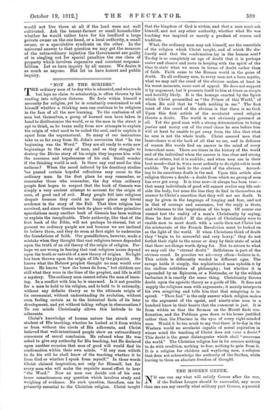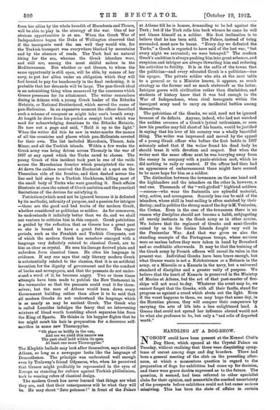THE MODERN GREEK.
NO one can say what will satisfy Greece after the war, if the Balkan League should be successful, any more than one can say exactly what military part Greece, separated
from her allies by the whole breadth of Macedonia and Thrace, will be able to play in the strategy of the war. One of her obvious opportunities is at sea. When the Greek War of Independence began the Duke of Wellington observed that if the insurgents used the sea well they would win, for the Turkish transport was everywhere blocked by mountains
and by the absence of roads. The Turk had no natural liking for the sea, whereas the Greek islanders were, and still are, among the most skilful sailors in the Mediterranean. But whether or not Greece, to whom the
same opportunity is still open, will be able, by means of her navy, to put her allies under an obligation which they will feel bound to pay for handsomely in the final reckoning, it is probable that her demands will be large. The pan-Greek ideal is an astonishing thing when measured by the resources which Greece possesses for its attainment. The writer remembers dining in Athens with a young Greek leader of the Ethnike Hetairia, or National Brotherhood, which served the cause of pan-Hellenism. In an expansive moment the officer described such a scheme of conquest as might take one's breath away. At length he drew from his pocket a receipt book which was used for acknowledging donations to the Ethnike Hetairia. He tore out a page and said, "Hold it up to the light." When the writer did this he saw in water-marks the names of all the countries and places which pan-Hellenists coveted for their own. The list included Macedonia, Thrace, Asia Minor, and all the Turkish islands. Within a few weeks the Greek army was being driven across Thessaly in the war of 1897 at any speed which the Turks cared to choose. The young Greek of this incident took part in one of the raids across the Macedonian frontier which precipitated the war. At dawn the raiders received the Eucharist at a spot on the Thessalian side of the frontier, and then dashed across the line and laid siege to a Turkish blockhouse, killing most of the small body of Turks who were guarding it. Such affairs illustrate at once the extent of Greek ambition and the practical limitations of the devices for satisfying it.
Patriotism (which need not be ignored because it is defeated by its methods), infirmity of purpose, and a passion for intrigue —these are the good and bad traits of the modern Greek, whether considered as politician or soldier. As for commerce, he understands it infinitely better than we do, and we shall not venture to criticise him in this respect. Greek patriotism is guided by the reflection that as Greece has a great past so she is bound to have a great future. The vague periods, such as the Frankish and Turkish Conquests, out of which the modern Greek has somehow emerged with a language very definitely related to classical Greek, are to him as clear as crystal. He sees his lineage derived plain and unbroken from classical times. He cites his language in evidence. If any one says that only literary modern Greek is substantially related to the classics, that it is an artificial invention for the dignity of government and for the conduct of books and newspapers, and that the peasants do not under- stand a word of it, he becomes angry. Two or three times attempts have been made to publish the New Testament in the vernacular so that the peasants could read it for them- selves; but the men of Athens would burn down every Government building rather than allow it to be said that all modern Greeks do not understand the language which is as nearly as may be ancient Greek. The Greek who is called Leonidas indulges the fancy that no intervening mixture of blood worth troubling about separates him from the King of Sparta. He thinks in his happier flights that he too might comb his hair in preparation for a decorous self- sacrifice in some new Thermopylae.
" Oh place us boldly in the van, And ere we yield this narrow sea The past shall hold within its span At least ono more Thermopylae."
The Klephtic ballads may look after themselves, says civilized
Athens, so long as a newspaper looks like the language of Demosthenes. The principle was understood well enough even by Trelawny's friend Odysseus, who, when he perceived that Greece might profitably be represented in the eyes of Europe as standing for culture against Turkish philistinism, took to wearing robes of classical design.
The modern Greek has never learned that things are what they are, and that their consequences will be what they will be. He may shout " Zeto polemos !" in front of the Palace
at Athens till he is hoarse, demanding to be led against the Turk ; but if the Turk rolls him back whence he came he will not blame himself as a soldier. His first inclination is to believe that he has been sold. The Palace, instead of being serenaded, must now be burnt. "Every day we defeated the Turks," a Greek is reported to have said of the last war, " but every night we retreated; we were betrayed." The modern Greek's ambition is always pushing him into great schemes, and suspicion and intrigue are always thwarting him and reducing his activities to futility. It is in the cafes of the towns that the politician—and every educated Greek is a politician—has his apogee. The private soldier who sits at the next table to a general or to a Minister knows, it appears, as much strategy as the former and as much statecraft as the latter. Intrigue grows with civilization rather than diminishes, and students of history know that it was bad enough in the War of Independence, when rival insurgents within the insurgent army used to carry on incidental battles among themselves.
The patriotism of the Greeks, we said, need not be ignored because of its defects. Anyone, indeed, who had not watched the sudden reverses of a Greek's lyrical enthusiasm, or seen bow his practice may fall short of his boasts, would be justified in saying that his love of his country was a wholly beautiful thing. The writer was impressed and moved by the appeal of a young Greek officer who before the first battle in 1897 solemnly asked that if the writer found his dead body he should treat it with devotion and respect. But when the writer met the same officer next he was hurrying away from the enemy in company with a panic-stricken mob, which he did nothing to rally or control. If the officer had then had an appearance of embarrassment there might have seemed to be more hope for him as a soldier.
The distinction between the townsmen on the one hand and the highlanders and the islanders on the other is, however, a real one. Thousands of the "well-girdled" highland soldiers —evzones—who wear the fustanella are splendid material, wiry, active, and courageous. Scarcely less can be said of the islanders, whose skill in boat-sailing is often matched by their daring; and in politics the strong man of the day is M. Venizelos, the Cretan. Even in the case of the townsman there is no reason why discipline should not become a habit, subjugating all unruly instincts in the Greek army as in other armies. We believe that the regiment of Greeks and semi-Greeks raised by us in the Ionian Islands fought very well in the Peninsular War. And that war gives us also the standing example of the Portuguese troops, whose services were so useless before they were taken in hand by Beresford and so creditable afterwards. It may be that the training of the Greek army by French officers will reveal ite value in the present war. Individual Greeks have been brave enough, but what Greece wants is not a Kolokotrones or a Botzaris in the army, or a Miaoulis or a Kanaris in the navy, but a universal standard of discipline and a greater unity of purpose. We believe that the heart of Kanaris is preserved in the Ministry of Marine at Athens, but the art of that past-master of fire- ships will not avail to-day. Whatever the event may be, we cannot forget that the Greeks, with all their faults, stand for progress as against a creed which shuts out the light. Even if the worst happens to them, we may hope that some day, in. the Horatian phrase, they will conquer their conquerors by carrying the arts of life into a less enlightened land. A Greece that could not spread her influence abroad would not be what she professes to be, but only a "sad relic of departed worth."















































 Previous page
Previous page